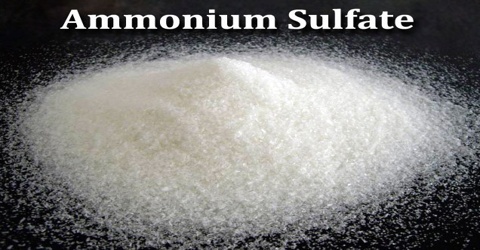Ammonium Sulphate Chemical supplier Nigeria
Epoxy Oilserv is the chemical supplier and distributor in Nigeria, We have large quantities of Ammonium Sulphate in our warehouses in Nigeria, contact us and get a free quote and availability report
About ammonium sulphate
Ammonium sulphate is a chemical compound, inorganic salt with a chemical formula (NH4)2SO4. It contains 21% nitrogen and 24% sulphur. It is a white crystalline solid with no smell. It dissolves easily in water to form crystals of salt. Ammonia gas is released when it reacts with alkaline substances. Ammonium sulphate is primarily used as a fertilizer for alkaline soil, laboratory applications, production of explosives, food additives, etc.
Preparation or production of ammonium sulphate
Ammonium sulphate has been in existence for more than 150 years. It was initially manufactured from ammonia released during the manufacturing of coal gas or coal coke used to produce steel. In this modern time, ammonium sulphate is produced by reacting sulfuric acid with heated ammonia often as a by-product of a coke oven with sulphuric acid. A mixture of ammonia gas and water vapor is introduced into a reactor that contains a saturated solution of ammonium sulphate and about 2% to 4% of free sulphuric acid at 60 degrees centigrade. Concentrated sulphuric acid is added to keep the solution acidic thereby retain its level of free acid. The temperature of the system or reactor is kept at 60 degrees centigrade because of the heat of the reaction. Powered ammonium sulphate is formed by spraying sulphuric acid into a reaction chamber filled with ammonia gas and the water in the system is evaporated as a result of heat present in the system thereby forming a powdery salt in the system.
2 NH3 + H2SO4 → (NH4)2SO
Uses of ammonium sulphate
Ammonium sulphate is used in several applications but primarily as an
- Artificial fertilizer for alkaline soils,
- Laboratory application,
- Food additives.
- Production of explosives, etc.
Fertilizer application of Ammonium Sulphate
The ammonium ion is released when ammonium sulphate is introduced into damp soil. This creates a small amount of acid, which lowers the pH balance of the soil. It also contributes to nitrogen, which aids in plant growth. It dissolves relatively slowly, which makes it cheaper than some other artificial fertilizers. Also, a solution containing dissolved ammonium sulfate is often added to post-emergence herbicide sprays to improve their effectiveness at weed control. This practice of increasing herbicide efficacy with ammonium sulfate works particularly well when the water supply contains significant concentrations of calcium (Ca), magnesium (Mg), or sodium (Na). A high-purity grade of ammonium sulfate often works best for this purpose to avoid plugging spray nozzles.
Ammonium sulphate as a food additive
Ammonium sulphate is also used as a food additive. It is often considered safe for consumption. It acts as an acidity regulator in flours and bread. Food companies commonly add ammonium sulphate to bread products as a dough conditioner. It acts as a yeast or acidity regulator to make bread rise during bread production. , it plays an important role in developing vaccines during the purification process. The DTap vaccine, which protects children from diphtheria, tetanus, and whooping cough, uses ammonium sulfate.
Protein purification by ammonium sulphate precipitation
Ammonium sulphate precipitation is a common method for protein purification by precipitation. As the ionic strength of a solution increases, the solubility of proteins in that solution decreases. Ammonium sulfate is extremely soluble in water due to its ionic nature, therefore it can “salt out” proteins by precipitation. Due to the high dielectric constant of water, the dissociated salt ions being cationic ammonium and anionic sulfate are readily solvated within hydration shells of water molecules. The significance of this substance in the purification of compounds stems from its ability to become more so hydrated compared to relatively more nonpolar molecules and so the desirable non-polar molecules coalesce and precipitate out of the solution in a concentrated form.
Other uses include
Ammonium sulfate is used on a small scale in the preparation of other ammonium salts, especially ammonium persulfate.
Ammonium sulfate has also been used in flame retardant compositions acting much like diammonium phosphate. As a flame retardant, it decreases the combustion temperature of the material, decreases maximum weight loss rates, and causes an increase in the production of residue. It is also used in making explosives.
Physical and chemical properties of ammonium sulphate
It occurs as odorless crystals or brown-gray to white granules. It is soluble in water and insoluble in alcohol and acetone. Other properties include the following parameters:
| Molecular Weight | 132.14 |
| Melting Point | 280 oC |
| pH | 5.5 (0.1 M aq solution) |
| Density/Specific Gravity | 1.77 at 50 oC. |
Some of the chemical properties are: It decomposes upon heating above 250 degrees centigrade into ammonia, nitrogen, sulphur dioxide, and water; it also forms multiple salts when mixed with sulphate metals.
Ammonium sulphate is one of the most important inorganic salts produced by treating ammonia, often as a by-product of coke ovens, with sulphuric acid. It has several applications as outlined above. It occurs as odorless crystals or brown-gray to white granules. It is soluble in water and insoluble in alcohol and acetone.
Epoxy oil serv. limited is a major distributor of ammonium sulphate and other various chemicals. Our approach to fine and specialty chemical distribution is to be your most reliable and resourceful partner. We pride ourselves on being Proactive sourcing specialists, distributors,s and producers of industrial cleaning and maintenance chemicals in Nigeria. Call on us or contact us or call your chemical inquiry you will be glad you did.
Submit your review | |
This sale is of high quality
Thanks please when placing your order give us 24 hours prior notice

